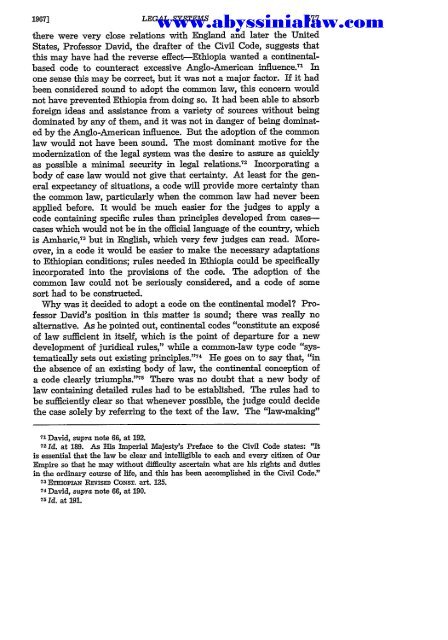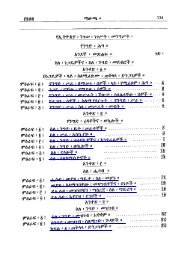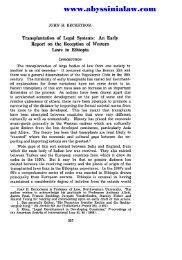Create successful ePaper yourself
Turn your PDF publications into a flip-book with our unique Google optimized e-Paper software.
19671 LEGAL SYSTEMS<br />
there were very close relations with England and later the United<br />
States, Professor David, the drafter of the Civil Code, suggests that<br />
this may have had the reverse effect-Ethiopia wanted a continentalbased<br />
code to counteract excessive Anglo-American influence. 7 1 In<br />
one sense this may be correct, but it was not a major factor. If it had<br />
been considered sound to adopt the common law, this concern would<br />
not have prevented Ethiopia from doing so. It had been able to absorb<br />
foreign ideas and assistance from a variety of sources without being<br />
dominated by any of them, and it was not in danger of being dominated<br />
by the Anglo-American influence. But the adoption of the common<br />
law would not have been sound. The most dominant motive for the<br />
modernization of the legal system was the desire to assure as quickly<br />
as possible a minimal security in legal relations. 7 2 Incorporating a<br />
body of case law would not give that certainty. At least for the general<br />
expectancy of situations, a code will provide more certainty than<br />
the common law, particularly when the common law had never been<br />
applied before. It would be much easier for the judges to apply a<br />
code containing specific rules than principles developed from casescases<br />
which would not be in the official language of the country, which<br />
is Amharic, 7 3 but in English, which very few judges can read. Moreover,<br />
in a code it would be easier to make the necessary adaptations<br />
to Ethiopian conditions; rules needed in Ethiopia could be specifically<br />
incorporated into the provisions of the code. The adoption of the<br />
common law could not be seriously considered, and a code of some<br />
sort had to be constructed.<br />
Why was it decided to adopt a code on the continental model? Professor<br />
David's position in this matter is sound; there was really no<br />
alternative. As he pointed out, continental codes "constitute an expos6<br />
of law sufficient in itself, which is the point of departure for a new<br />
development of juridical rules," while a common-law type code "systematically<br />
sets out existing principles." 7 4 He goes on to say that, "in<br />
the absence of an existing body of law, the continental conception of<br />
a code clearly triumphs." 75 There was no doubt that a new body of<br />
law containing detailed rules had to be established. The rules had to<br />
be sufficiently clear so that whenever possible, the judge could decide<br />
the case solely by referring to the text of the law. The "law-making"<br />
71 David, supra note 66, at 192.<br />
www.abyssinialaw.com<br />
72 Id. at 189. As His Imperial Majesty's Preface to the Civil Code states: "It<br />
is essential that the law be clear and intelligible to each and every citizen of Our<br />
Empire so that he may without difficulty ascertain what are his rights and duties<br />
in the ordinary course of life, and this has been accomplished in the Civil Code."<br />
7 3 ETmoPriA REvisED CoNs. art. 125.<br />
74 David, supra note 66, at 190.<br />
75 Id. at 191.





